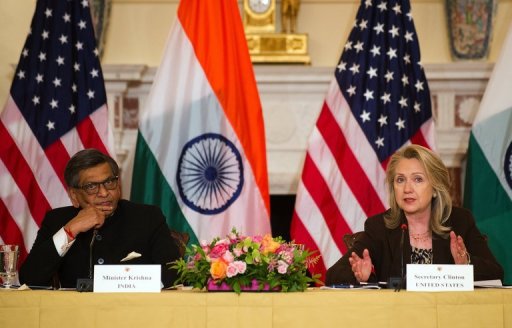The United States and India sought Wednesday to dispel doubts over their relationship as a US company signed a deal on nuclear power — an area emblematic of disappointment between the countries.
US Secretary of State Hillary Clinton, holding annual talks with India, said that the world’s two largest democracies were entering a “new and more mature phase” in relations where they worked closely on the world’s major issues.
But the deal that was arguably the most dramatic of the past breakthroughs between India and the United States — a 2008 agreement on nuclear power — has increasingly been cited as proof that US-India relationship has not lived up to its potential.
On Wednesday, US-based Westinghouse Electric Co. announced that it was signing a preliminary deal with the state-run Nuclear Power Co. of India to build the first US nuclear reactors in the South Asian nation.
Westinghouse, a unit of Japan’s Toshiba Corp., said that it had agreed to conduct initial licensing and site development work to build reactors at the Mithivirdi site in the western state of Gujarat.
Clinton called the agreement “a significant step toward the fulfillment” of the landmark US-India nuclear agreement, but acknowledged that the deal was preliminary and there was “still a lot of work to be done.”
Former president George W. Bush spearheaded the 2008 deal, which recognized India’s global stature by giving it access to civilian nuclear technology after decades of being treated as a pariah for building nuclear weapons.
But US companies have been reluctant to get to work in India as they are seeking greater protection from liabilities in the event of a nuclear disaster — a dispute that could still potentially affect the Westinghouse deal.
The United States argues that other countries such as Russia and France enjoy an unfair advantage as their nuclear companies have the backing of the state which can handle liabilities. The issue is sensitive in India, where thousands died in 1984 in a leak from a US-owned pesticide factory in Bhopal.
India has pledged to move ahead with nuclear power to support its growing economy and reduce the need for oil imports and dirty coal, despite rising global concerns about atomic energy since Japan’s Fukushima disaster.
Despite concerns on both sides about the nuclear agreement, overall relations have been growing between the United States and India with the two governments forecasting that two-way trade may hit $100 billion for the first time this year.
The United States and India, which had uneasy relations during the Cold War, have also found common cause on security issues. India is one of the most enthusiastic supporters of US-led efforts in Afghanistan as Islamic extremists consider New Delhi a top target.
The United States has welcomed India’s assistance to Afghanistan. Pakistan has fiercely opposed its arch-rival’s influence in Afghanistan, but US relations have sharply deteriorated with Pakistan since last year.
Clinton also welcomed India’s reductions of oil purchases from Iran. On Monday, Clinton exempted India from new US sanctions on countries that maintain trade with Iran despite Israeli and Western concerns over its nuclear program.
But Clinton repeated US hopes for movement by India on commercial areas including nuclear liabilities and restrictions on foreign retailers such as Walmart in the billion-plus market.
Krishna said that India and the United States were making “tangible and continuous progress” in cooperating on areas from trade to energy to higher education.

COMMENTS
Please let us know if you're having issues with commenting.